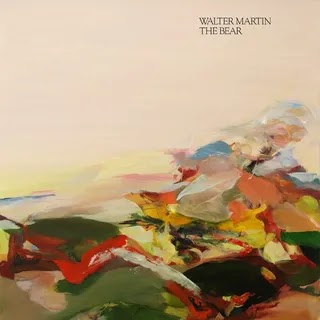On a bittersweet and impressionistic solo album, the former Walkmen member confronts the joys and humiliations of a life devoted to music.
Life is long and rock stardom is fleeting. If you’re lucky enough to make it to middle age, you might hear a song from a past life and scarcely recognize yourself. Stephen Malkmus once wandered into a bakery and struggled to place a Pavement B-side inexplicably resurrected by a streaming algorithm. There’s the legend of Steven Tyler hearing an Aerosmith deep cut in a drug-addled haze and suggesting the band cover it. (“It’s us, fuckhead,” Joe Perry supposedly admonished him.)
Walter Martin tells a story like that—well, not like that—halfway through “Easter,” the melancholy centerpiece of his sixth solo studio album, The Bear. Over rustling guitar and the plaintive whine of a lap steel, Martin describes the experience of hearing his old band—presumably the Walkmen, in whose ranks he served 13 years—on the radio. “But I didn’t recognize my old friends/And I didn’t recognize myself,” Martin sings in that croaky, endearing voice that tends to imbue his songs with a certain sincerity. The kicker is that Martin frames this story not with sadness or nostalgia but with gratitude: “I thanked the Lord I’d found that I was someone else,” he sings.
Martin has been someone else for nearly a decade now, since the Walkmen entered hiatus and he abandoned all pretensions of coolness by making a debut solo record for kids. Few indie veterans have activated aging-dad-songwriter mode more gracefully. Martin’s first few solo albums were full of funny, family-friendly folk singalongs about zoo animals, art museums, and trips to Australia, but 2020’s The World at Night, inspired by the death of friend and ex-bandmate Stewart Lupton, carried a more wistful tone. The Bear follows in that spirit. Martin’s songwriting is bittersweet and reflective, full of musings on music and family and an uncertain future. He imbues the material with a deeper sense of himself, even as he is less concerned than ever with letting listeners know what exactly he’s singing about.
A warmth radiates from The Bear, which is impressive since the record opens with an ambling wintry tale called “Hunters in the Snow.” Much of the material was written in a one-room schoolhouse in upstate New York, with only a stove for heat, during that first Covid winter. Some of this warmth stems from Martin’s fondness for the tone of vintage gear, a holdover from his Walkmen days. The twinkly piano that pitter-patters into the foreground on “Baseball Diamonds” is reminiscent of the wobbly piano sound on Walkmen classics like “The Blizzard of ’96” and “We’ve Been Had,” except here it’s played by film composer Emile Mosseri, whom Martin reached out to on a whim after hearing his work in Minari.
There is a trebly glow to everything. The dominant sound is Martin’s own guitar: light fingerpicking on a 1955 Gretsch, a lovely, faded sound that complements his unpolished voice. Given how much old-fashioned care went into these recordings, the only disappointment is his overreliance on stagnant and familiar folk melodies. Martin can write a rich, slow-burning tune—“Easter” and “The Song Is Never Done” are proof—yet he burdens the otherwise moving “Hiram Hollow” with a traditional waltz melody that sounds like it was recycled from an old Pogues song. “Not My Mother,” with its meandering, loping gait, feels similarly flat. Yet Martin’s charm and self-deprecation always shine through, as he confronts both the joys and discontents of a life devoted to music. “The Song Is Never Done” is a highlight about his life’s work aspiring to write the perfect song. (“No, it’s not this one,” he clarifies midway through.)
In an explanatory pamphlet that accompanies the vinyl, Martin admits that his instinct has often been to write songs as directly as possible to keep live audiences engaged. On The Bear, he tried to let that go. “I let myself write more loosely, like a painter or something,” he writes, and it pays off; songs like “New Green” and “Easter,” with its veiled references to early-pandemic anxieties, are impressionistic and open-ended.
Ironically, Martin’s least direct album proves to be his most revealing and memoiristic. There’s a wonderful moment in the title track where he condenses the story of his entire adult life into one 90-second verse. He recalls a dream that he was in a “mid-level rock-and-roll band,” crisscrossing the country’s “shithole nightclubs”; when it ended, “I was bald, broke, and 39”; after that came marriage, child-rearing, and raising chickens, “out here where the buffalo roam.” You can learn a lot about Martin from this verse, and not just his life’s trajectory. His friendly-raconteur approach to songwriting, his self-effacing humor, his weathered voice, his optimism and disinterest in fronting as cool—it’s all there. I suspect that, if he were to hear it playing in the wild 20 years from now, he would recognize himself.



0 comments:
Post a Comment